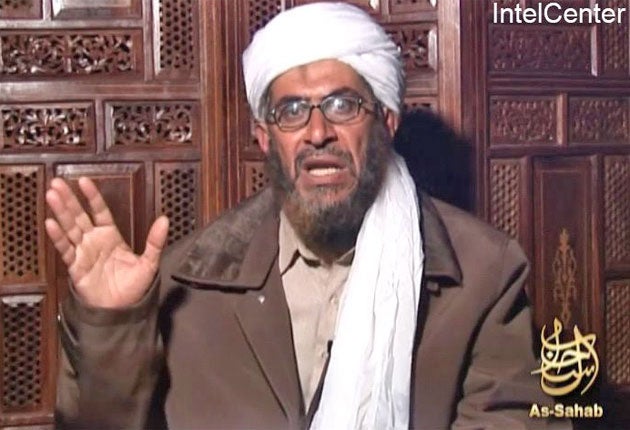Al-Qa'ida's No 3 killed by US drone strike
Terror group confirms Mustafa Abu al-Yazid's death in Pakistan

One of Osama bin Laden's most senior lieutenants who was in charge of al-Qa'ida's Afghan war was killed in a US air strike, it emerged yesterday on the eve of a "peace jirga" aimed at ending the country's brutal conflict.
The assassination of Mustafa Abu al-Yazid inside Pakistan with missiles fired from an unmanned drone last month was greeted as a great success by Nato. The veteran Egyptian born jihadist was one of the founder members of al-Qa'ida and was regarded the third most powerful figure in the organisation.
Yazid, also known as Sheikh Sa'id al-Masri, is believed to have been killed at the village of Boya near Miranshah in North Waziristan, a frontier region which had been a stronghold of both the Afghan and Pakistan Taliban and foreign fighters.
An al-Qa'ida statement posted on an Islamist website said 54-year-old Yazid's wife, three daughters, and a granddaughter also died when a missile struck the compound where he was staying. "His death will only be a severe curse by his life upon the infidels", said the message.
Yazid was arrested over the killing of the Egyptian President Anwar Sadat in 1981 and spent time in jail with Ayman al-Zawahiri, a fellow Egyptian who would become al-Qa'ida's deputy chief, before going to Afghanistan to join the fight against the Russians. By 1991 he was travelling with Bin Laden when he moved from Afghanistan to Sudan, worked as an accountant in Bin Laden's construction company, before both returned to Taliban-controlled Kabul in 1996. He became a close confidant of Bin Laden and is reported to have been the paymaster for the 9/11 attacks in New York.
Yazid is thought to have inherited the post of al-Qa'ida's No 3 after his predecessor, Abu Ubaidah al-Masri, died of hepatitis in Pakistan. Recently he had become a regular figure in videos released by as-Sahab, the media arm of al-Qa'ida, praising Islamist attacks in various countries and "martyrdoms" of those who had fallen in the struggle.
His last public appearance was on 4 May when he read out eulogies for Abu Omar al-Baghdadi and Abu Ayyub al-Masri, the two top al-Qa'ida commanders in Iraq killed by Iraqi government and American forces. The increasing frequency of his video role raised his profile in the international jihadist network. However, it also brought more scrutiny from Western intelligence services and made it easier for them to track his movements.
The White House said last night his death was a severe blow to the network. Spokesman Robert Gibbs said Yazid was one of the biggest al-Qa'ida targets to be captured or killed in five years.
Although al-Qa'ida has been involved in the Afghan insurgency, its role had been relatively limited. Yazid, a fluent Pashto speaker, is said to have been tasked by Bin Laden with establishing joint operations with the Taliban and other militant networks such as the Gulbuddin Hekmatyar and Jalaluddin Haqqani groups.
None of these insurgent groups will be represented among the 1,600 delegates due to gather under a huge tent in Kabul today, after the insurgents declared the conference was a pointless exercise. On the other end of the political and social spectrum there was concern that the government of President Hamid Karzai may compromise on issues such as female rights to reach a deal with the fundamentalist militants in the Pashtun south.
Fauzia Kofi, a Tajik MP from Badakhshan in the north, one of the female delegates who comprise 20 per cent of conference, said: "This programme with Karzai sounds like kind of a deal with the Taliban. We are very worried."
However the Afghan government insisted that the conference will help build a consensus on how to bring the insurgency to a negotiated end.
For the West, some sort of progress on the political front in Afghanistan is also expedient, with domestic antipathy towards the war leading countries such as Canada and the Netherlands to withdraw troops.
"It is important for the Afghan and Western audiences that there is something taking place," Vygaudas Usackas, the EU ambassador to Afghanistan, said.
Join our commenting forum
Join thought-provoking conversations, follow other Independent readers and see their replies
Comments
Bookmark popover
Removed from bookmarks